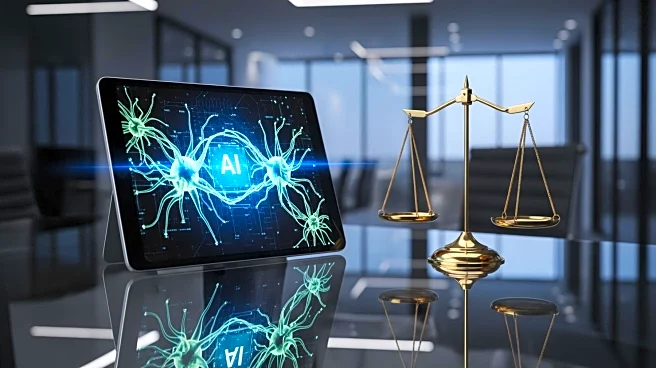What's Happening?
Artificial Intelligence (AI) is being increasingly integrated into human resources (HR) within the hotel industry to optimize various tasks and improve employee engagement. According to the Society of
Human Resources Management (SHRM), 40% of U.S. employers are already utilizing AI in recruitment processes. AI tools are being used to handle mundane tasks, allowing HR professionals to focus on more strategic activities. The integration of AI is seen as a way to enhance the human aspect of HR by providing insights and supporting decision-making processes. The article outlines five rules for optimizing AI in HR, emphasizing the importance of pairing AI with human oversight, auditing AI for bias, and ensuring vendors use AI appropriately.
Why It's Important?
The integration of AI in HR is significant as it represents a shift towards more efficient and personalized employee management. By automating routine tasks, AI allows HR professionals to focus on strategic initiatives that can improve employee satisfaction and retention. This technological advancement is crucial for the hospitality industry, which relies heavily on human interaction and service quality. The use of AI can lead to better recruitment processes, enhanced employee engagement, and improved overall organizational performance. However, it also raises concerns about potential biases and the need for human oversight to ensure ethical use of AI.
What's Next?
As AI continues to be integrated into HR practices, companies will need to focus on developing strategies that balance AI capabilities with human oversight. This includes creating structured prompts for AI inquiries and auditing AI outputs for bias. HR leaders will need to ensure transparency in AI usage and communicate its benefits to employees. Additionally, companies will need to monitor AI's impact on employee engagement and performance, adjusting strategies as necessary to optimize outcomes. The ongoing evolution of AI in HR will require continuous adaptation and learning to fully harness its potential.
Beyond the Headlines
The ethical implications of AI in HR are significant, as the technology can inadvertently introduce biases into decision-making processes. Companies must be vigilant in auditing AI outputs and ensuring that AI tools are used responsibly. The cultural impact of AI integration is also noteworthy, as it requires a shift in how HR professionals approach their roles and interact with employees. Transparency and communication are key to fostering trust and acceptance of AI within the workforce.









